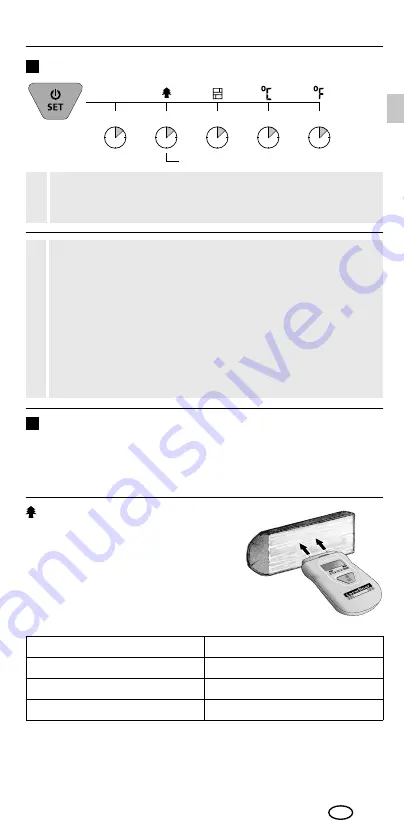
DampCheck
09
Measurement procedure notice
Be sure neither supply lines (electric lines, water pipes, etc)
nor a metal subsurface is present at the location to be
measured. Insert the electrodes as far into the material as
possible but never use excessive or sudden impact force as
this could damage the unit. Always pull the unit out of the
material with left/right twisting motion.
Perform several
comparative measurements at different locations
to
minimise measurement error. The sharply pointed electrodes
present an injury hazard. Always put the safety cap on the
unit when it is not in use or being transported.
!
The device starts with the measuring mode last selected.
To select the mode, press and hold the Set button for
3 seconds or briefly wait until the symbol stops flashing.
!
3
1 sec
3 sec
1 sec
1 sec
1 sec
1x
1x
1x
1x
1x
To change measuring mode
Device on
Symbols flash
EN
4
DampCheck
Wood
The location to be measured should be
untreated, free of knots, dirt and resin.
Measurements should not be made on
the end faces of wood because these
areas dry particularly quickly such that
they produce incorrect measurement
results.
Wood moisture measuring range
< 6%
All LEDs off
≥ 6% to < 16%
Green LED flashing
≥ 16% to < 20%
Yellow LED flashing
≥ 20%
Red LED flashing
To measure material moisture
Dry/wet indicator
In addition to the numerical moisture value, the LEDs (green, yellow
and red) provide a rough estimation whether the material is dry
(green), moist (yellow) or wet (red).
The following types of wood in Group A can be read off directly:
beech, linden, willow, ebony and teak. A correction factor of 2 - 3%
must be added when measuring types of wood in Group B
(oak, maple, alder, spruce, birch).
Summary of Contents for DampCheck
Page 62: ...62...
Page 63: ...DampCheck 63...










































